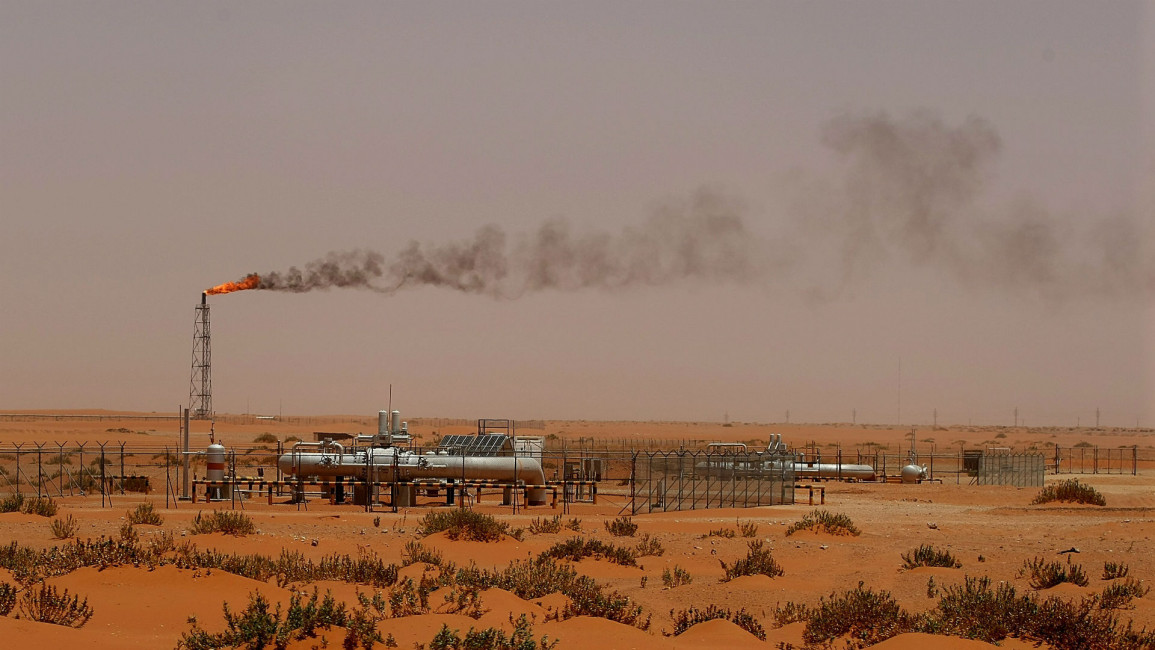Saudi Arabia launches study of possible post-OPEC future
Saudi Arabia launches study of possible post-OPEC future
Saudi Arabia is considering what the future could hold, if oil cartel OPEC were to break-apart.
3 min read
Saudi Arabia is considering a post-OPEC future [Getty]
Saudi Arabia has launched a study detailing the global economic market should the Organisation of the Petroleum Exporting Countries (OPEC) break apart, the Wall Street Journal reported on Friday.
The planned scenario - known as NOPEC - is not a move by Riyadh to pull out of the oil cartel, but it does offer a glimpse of a world without the organisation and reflects fears in Riyadh of a "peak oil" crisis.
It also shows that Saudi Arabia is considering the eventuality that the world will one day experience the phenomenon of "peak oil", which would see shrinking demand for the resource.
Such an outcome would likely have a devastating impact on producers such as Saudi Arabia, who rely heavily on the sale of oil for government budgets.
"The kingdom knows demand for oil won't last forever…so you need to think past OPEC," the senior adviser said, according to the journal.
"You also have a NOPEC act being considered" in Washington.
OPEC argues that the cartel keeps prices at a fair, sustainable price, and allows producers to collectively open the taps once oil prices become too high.
The study also addresses the recent collusion between Saudi Arabia and non-OPEC production giant Russia, to cut global supplies after oil prices plummeted to around $30 a barrel.
The move saw prices rise to around $80, before levelling out to around $70 a barrel.
But the possibility that lower demand for oil could see OPEC members clash on key issues, is one actively being considered by Saudi officials, even though this doesn't represent an active debate about withdrawing from the cartel.
Some OPEC members have already voiced unease at being sidelined by the recent Russian-Saudi oil production deal.
The review by the King Abdullah Petroleum Studies and Research Center (Kapsarc) - which advises government and Saudi OPEC officials - follows other studies on possible falling demand for oil.
Earlier studies showed that the break-up of OPEC "would lead to a more volatile price environment and be negative for the global economy".
It follows plans for the part-privatisation of Saudi oil giant OPEC, which were put on hold after it became obvious that Riyadh's expected returns were hugely optimistic.
Saudi Arabia has pursued a policy of attempting to diversify its economy away from its reliance on oil and gas receipts, particularly through Crown Prince Mohammed bin Salman's Vision 2030.
The plans have also been hugely disappointing, particularly after the ARAMCO IPO stalled.
Saudi Arabia suffered a huge PR loss after the murder of Jamal Khashoggi at the kingdom's consulate in Istanbul with international businesses rethinking their relationship with the crown prince.
The planned scenario - known as NOPEC - is not a move by Riyadh to pull out of the oil cartel, but it does offer a glimpse of a world without the organisation and reflects fears in Riyadh of a "peak oil" crisis.
It also shows that Saudi Arabia is considering the eventuality that the world will one day experience the phenomenon of "peak oil", which would see shrinking demand for the resource.
Such an outcome would likely have a devastating impact on producers such as Saudi Arabia, who rely heavily on the sale of oil for government budgets.
"The kingdom knows demand for oil won't last forever…so you need to think past OPEC," the senior adviser said, according to the journal.
"You also have a NOPEC act being considered" in Washington.
President Donald Trump has been a vocal critic of OPEC, which he believes is keeping oil prices artificially high, to the detriment to consumer countries such as the US.
OPEC argues that the cartel keeps prices at a fair, sustainable price, and allows producers to collectively open the taps once oil prices become too high.
The study also addresses the recent collusion between Saudi Arabia and non-OPEC production giant Russia, to cut global supplies after oil prices plummeted to around $30 a barrel.
The move saw prices rise to around $80, before levelling out to around $70 a barrel.
But the possibility that lower demand for oil could see OPEC members clash on key issues, is one actively being considered by Saudi officials, even though this doesn't represent an active debate about withdrawing from the cartel.
Some OPEC members have already voiced unease at being sidelined by the recent Russian-Saudi oil production deal.
The review by the King Abdullah Petroleum Studies and Research Center (Kapsarc) - which advises government and Saudi OPEC officials - follows other studies on possible falling demand for oil.
Earlier studies showed that the break-up of OPEC "would lead to a more volatile price environment and be negative for the global economy".
It follows plans for the part-privatisation of Saudi oil giant OPEC, which were put on hold after it became obvious that Riyadh's expected returns were hugely optimistic.
Saudi Arabia has pursued a policy of attempting to diversify its economy away from its reliance on oil and gas receipts, particularly through Crown Prince Mohammed bin Salman's Vision 2030.
The plans have also been hugely disappointing, particularly after the ARAMCO IPO stalled.
Saudi Arabia suffered a huge PR loss after the murder of Jamal Khashoggi at the kingdom's consulate in Istanbul with international businesses rethinking their relationship with the crown prince.



